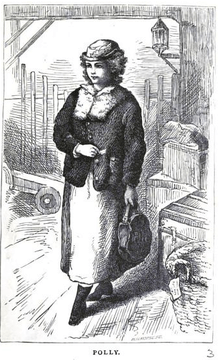An Old-Fashioned Girl
 Polly (Roberts Bros., 1870) | |
| Author | Louisa May Alcott |
|---|---|
| Country | United States |
| Language | English |
| Publisher | Roberts Brothers |
Publication date | 1869 |
| Media type | |
An Old-Fashioned Girl is a novel by Louisa May Alcott.
It was first serialised in the Merry's Museum magazine between July and August in 1869 and consisted of only six chapters. For the finished product, however, Alcott continued the story from the chapter "Six Years Afterwards" and so it ended up with nineteen chapters in all. The book revolves around Polly Milton, the old-fashioned girl who titles the story. Polly visits her wealthy friend Fanny Shaw in the city and is overwhelmed by the fashionable and urban life they live––but also left out because of her "countrified" manners and outdated clothes.
The novel was the basis of a 1949 musical film starring Gloria Jean as Polly.[1]
Plot summary
Polly Milton, a 14-year-old country girl, visits her cousin Fanny Shaw and her wealthy family in the city for the first time. Poor Polly is overwhelmed by the splendor at the Shaws' and their urbanized, fashionable lifestyles, expensive clothes and other habits she has never been exposed to, and, for the most part, dislikes. Fanny's friends reject her because of her different behavior and simple clothing, and Fan herself can't help considering her unusual sometimes. However, Polly's warmth, support and kindness eventually win the hearts of all the family members, and her old-fashioned ways teach them a lesson.

Six years later, Polly comes back to the city to become a music teacher and struggles with profession issues and internal emotions. Later in the book, Polly finds out that the prosperous Shaws are on the brink of bankruptcy, and she guides them to the realization that a wholesome family life is the only thing they will ever need, not money or decoration.
With the comfort of the ever helpful Polly, the family gets to change for the better and to find a happier life for all of them. After being rejected by his fiancée, Trix, Tom procures a job out West, with Polly's brother Ned, and heads off to help his family and compensate for all the money he has wasted in frivolous expenditures. At that point of the book, we see that Polly and Tom seem to have developed strong feelings for one another.
At the end of the book, Tom returns from the West and finally gets engaged to his true love, Polly.
Notes
External links
Sources
See also
References

- Anonymous review. The Daily Graphic [New York] [September 1875?]. Reprinted in Louisa May Alcott: the contemporary reviews. Ed. by Beverly Lyon Clark. Cambridge: Cambridge University Press, 2004. ISBN 0-521-82780-9.
- Anonymous review. The Literary World 6.4 (1 September 1875), 55. Reprinted in Louisa May Alcott: the contemporary reviews. Ed. by Beverly Lyon Clark. Cambridge: Cambridge University Press, 2004. ISBN 0-521-82780-9.
- Anonymous review. Taunton Daily Gazette 43.65 (18 September 1875), 2:1. Reprinted in Louisa May Alcott: the contemporary reviews. Ed. by Beverly Lyon Clark. Cambridge: Cambridge University Press, 2004. ISBN 0-521-82780-9.
- Lamb, Robert Paul, and Gary Richard Thompson. A Companion to American Fiction, 1865 - 1914. New Jersey: Wiley-Blackwell, 2006. ISBN 1-4051-0064-8.
- Macleod, Anne Scott (Spring 1992). "From Rational to Romantic: The Children of Children's Literature in the Nineteenth Century". Poetics Today 13 (1): 141–153. doi:10.2307/1772794. JSTOR 1772794.
- Saxton, Martha. Louisa May Alcott: a modern biography. New York: Macmillan, 1994. ISBN 0-374-52460-2.
- Schultz, Lydia A. (Fall 2002). "'Work with a Purpose': Alcott's 'An Old-Fashioned Girl' and the American Work Ethic". College Literature 29 (4): 26–46.
- Wadsworth, Sarah A. (2001). "Louisa May Alcott, William T. Adams, and the Rise of Gender-Specific Series Books". The Lion and the Unicorn 25 (1): 17–46. doi:10.1353/uni.2001.0015.
| Wikisource has original works written by or about: An Old-Fashioned Girl |
| Wikiquote has quotations related to: An Old-Fashioned Girl |
| Wikimedia Commons has media related to An Old-Fashioned Girl. |
| Wikisource has original text related to this article: |
| ||||||||||||||||||||||||||||
